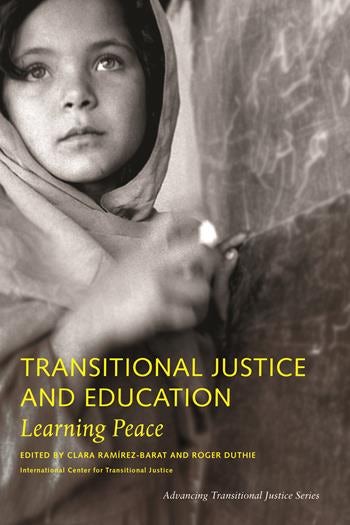Transitional Justice and Education
Learning Peace
Social Science Research Council

Transitional Justice and Education
Learning Peace
Social Science Research Council
After periods of conflict and authoritarianism, educational institutions often need to be reformed or rebuilt. But in settings where education has been used to support repressive policies and human rights violations, or where conflict and abuses have resulted in lost educational opportunities, legacies of injustice may pose significant challenges to effective reform. Peacebuilding and development perspectives, which normally drive the reconstruction agenda, pay little attention to the violent past. Transitional Justice and Education: Learning Peace presents the findings of a research project of the International Center for Transitional Justice on the relationship between transitional justice and education in peacebuilding contexts. The book examines how transitional justice can shape the reform of education systems by ensuring programs are sensitive to the legacies of the past, how it can facilitate the reintegration of children and youth into society, and how education can engage younger generations in the work of transitional justice.
This edited volume provides a rich set of case studies from some of the world's most intractable conflicts and makes an important contribution to the literature on education, conflict, and peacebuilding. It provides practical examples of the ways that education can contribute to transitional justice—through reparations and by addressing educational inequalities, by engaging children and young people in nonformal education, and, the most difficult challenge of all, by helping successive generations learn about the violent conflicts that have affected their own societies. Essential reading for education and development practitioners. Alan Smith, Alan Smith, UNESCO Chair in Pluralism, Human Rights and Democracy, Ulster University
A crucial addition to work on cultural rights, truth, justice, reconciliation, and nonrecurrence, this collection illustrates the vitality of ensuring multivoice narratives, as stressed in my UN special rapporteur reports on history teaching and memorialization processes. Case studies exploring how education policies can mitigate past injustices or set the pattern for further injustices provide invaluable new insights. Farida Shaheed, executive director, Shirkat Gah–Women's Resource Centre, Pakistan, and former UN special rapporteur in the field of cultural rights
Transitional justice processes seek to promote social healing in the aftermath of armed violence and authoritarian repression. Transitional Justice and Education: Learning Peace shows the decisive role that schools can play in that healing process through the transformation of our values and our moral imagination. This book presents a deep understanding of the connection between education and peace and provides a rich variety of examples that will undoubtedly strengthen our capacity to build peace upon truth, memory, and justice. Salomón Lerner Febres, executive president, Institute for Democracy and Human Rights, Pontifical Catholic University of Peru, and former president of the Truth and Reconciliation Commission of Peru
The volume is impressively broad. Cynthia M. Horne, Democratization
1. Teaching about the Recent Past and Citizenship Education during Democratic Transitions, by Ana Maria Rodino
2. Education Reform through a Transitional Justice Lens: The Ambivalent Transitions of Bosnia and Northern Ireland, by Karen Murphy
3. History, Memory, and Education: Is It Possible to Consolidate a Culture of Peace in Guatemala?, by Gustavo Palma MurgaPart II: Reparations, Redress, and Education
4. Education for Overcoming Massive Human Rights Violations, by Cristián Correa
5. Education as a Form of Reparation in Chile, by Lorena Escalona González
6. Access to Education as Redress for Victims in South Africa, by Teboho MojaPart III: Outreach, Education, and Sustainability
7. Outreach to Children in the Transitional Justice Process of Sierra Leone, by Zoé Dugal
8. Building a Legacy: The Youth Outreach Program at the ICTY, by Nerma Jelacic
9. Outreach and Education at the Liberation War Museum in Bangladesh, by Mofidul Hoque
10. Historical Commissions and Education Outreach: Challenges and Lessons for Transitional Justice, by Alexander KarnPart IV: Civil Society, Education, and Transitional Justice
11. Facing the Past—Transforming Our Future: A Professional Development Program for History Teachers in South Africa, by Dylan Wray
12. Addressing the Recent Past in Schools: Reflections from Côte d'Ivoire, by Virginie Ladisch and Joanna Rice
13. Grappling with Lebanon's Enduring Violence: Badna Naaref, an Intergenerational Oral History Project, by Lynn Maalouf and Christalla YakinthouContributors
